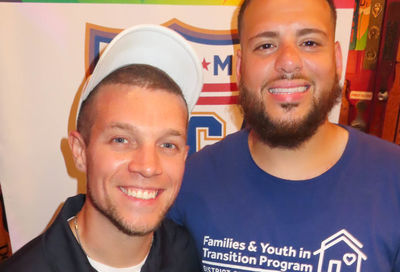Coachella Demands Removal of STD Testing Billboard
Organizers of Coachella took umbrage at a billboard from AIDS Healthcare Foundation advertising the organization's free STD testing services.

Organizers of the Coachella Valley Music and Arts Festival were outraged after a billboard advertising free STD testing was erected along the freeway in Indio, California, just 15 minutes from the concert site.
“Catch more than vibes?” the billboard reads.
Beneath the words is a bubble advertising the website freestdcheck.org and a photo of the Empire Polo Club, site of Coachella festival, which takes place annually over two separate weekends, with the first three days of musical acts starting on April 12. The festival is expected to draw about 125,000 revelers.
The billboard, erected along the Interstate 10 freeway last month, was paid for by the Los Angeles-based AIDS Healthcare Foundation, a nonprofit focusing on HIV prevention, testing, and treatment.
Coachella festival organizers quickly demanded AHF take down the ad.
AHF Vice President of Marketing Jason Farmer told the Southern California newspaper The Press-Enterprise that an attorney for AEG Presents, the parent company of Goldenvoice, the lead organizer of the festival, had contacted AHF’s media placement company to request the removal of the billboard, alleging that the photo used in the ad constituted “copyright infringement.”
Farmer said AEG Presents may also have objected to the billboard because they “felt it was putting a negative light” on the festival.
The billboard doesn’t name the festival directly but features a photo of the festival environment, echoing the style of the official Coachella poster.
The photo appears to be from Getty Images and has been purchased and used by several media outlets.
AHF refused to take down the billboard, which will remain on display through April.
“We don’t feel like we’re in the wrong,” Farmer said. “We talked to the owners of the billboard, too, and they were against taking it down.”
Michael Weinstein, AHF’s president and co-founder, was less diplomatic.
“What are Coachella organizers afraid of?” he said. “Do they really not know how people spend their time during festival weekends?”
He added, “It doesn’t help anyone to bury their heads in the desert sand and pretend people aren’t having sex. We want everyone to use condoms and practice safer sex, but if they don’t, we also want them to know where to get STD tested easily and for free.”
In past years, AHF has placed billboards along Interstate 10 in the hopes that festival attendees and others heading toward Los Angeles, where AHF has multiple testing locations, will see them and pursue testing if needed.
Farmer told The Press-Enterprise that even though AHF doesn’t have data on the level of STD transmission at the festival, the placement of the billboard ensures a broad audience will be able to see the foundation’s message.
AHF has a history of unabashed advocacy on behalf of safer sex practices, and has previously waded into public debates over sex education, HIV prevention tactics, drug prices, and related issues. The organization was the driving force behind a failed 2016 ballot initiative that sought to require porn producers to use condoms when filming.
AHF has also become known for its attention-grabbing ads.
Last month, its ad saying “Just use it,” which featured an image of banana with a condom over it, became a finalist for the OBIE advertisement awards.
Other billboards include a warning about drug-resistant gonorrhea featuring a ship sinking after hitting an iceberg, messages about syphilis and homelessness incorporating the California flag, and another STD testing ad reading, “Feel the Burn?”
AHF has courted controversy and garnered headlines with its involvement in the Rose Parade, a New Year’s Day tradition in which floral-decorated floats traverse through Pasadena, California, ahead of the Rose Bowl. In 2014, a same-sex marriage ceremony took place atop AHF’s wedding cake-themed float, leading to threats of a boycott by conservative organizations.
Some TV stations broadcasting the Rose Bowl cut away from the parade rather than show the wedding.
Farmer told Metro Weekly that AHF often tries to relate its sexual health ad campaigns to larger pop culture trends, taking into account increases in the rate of new cases of specific STDs, newer or more dangerous strains, and the need for education on the different types of STDs that exist.
“We want to normalize discussion about STDs [and] safe sex, and remove stigma that exists around the topic,” Farmer wrote in an email. “We often use humor in our ad campaigns to get our message across, build interest and to stand out from the more clinical approach to STD education that others use.
“We test most of our billboard campaigns with a wide audience prior to running them to make sure that our message is understood and liked by the viewer,” he continued. “We have been running billboards across the country (and globally) for over 15 years. What we have found is that people do not like fear-mongering or judgmental messages about STD prevention. We know that a mix of clever, eye-catching, and sometimes funny advertising about serious topics of sexual health get the best response.”
Farmer also noted that visitors to AHF’s STD testing wellness clinics are asked how they heard about the organization, with many citing AHF’s billboards, which indicates that the foundation’s messaging tactics are successful in reaching their intended audience.
“We know that putting the message out on the street and offering places to get free STD testing service and other wellness services, in a clean, safe and inviting environment is the first step in getting people into care,” Farmer said.
“We know that we are being effective in combating HIV by having almost 2 million people in care around the world. The amount of STD testing and treatment that we do annually, along with the education that we provide on sexual health, condom promotion, and distribution, is proof that we are making a huge impact in the fight for sexual health.”
Support Metro Weekly’s Journalism
These are challenging times for news organizations. And yet it’s crucial we stay active and provide vital resources and information to both our local readers and the world. So won’t you please take a moment and consider supporting Metro Weekly with a membership? For as little as $5 a month, you can help ensure Metro Weekly magazine and MetroWeekly.com remain free, viable resources as we provide the best, most diverse, culturally-resonant LGBTQ coverage in both the D.C. region and around the world. Memberships come with exclusive perks and discounts, your own personal digital delivery of each week’s magazine (and an archive), access to our Member's Lounge when it launches this fall, and exclusive members-only items like Metro Weekly Membership Mugs and Tote Bags! Check out all our membership levels here and please join us today!


























You must be logged in to post a comment.